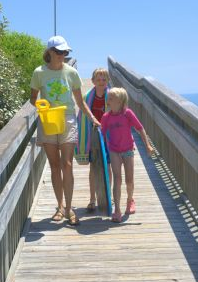
Tips on travelling with autistic kids.
Often, families with autistic children avoid travelling because a child with autism can often be badly affected by changes in routine or environment. Nevertheless, you should not feel like you can’t, it may be difficult but planned in advance, it’s more than possible. Some kids learn faster and some may need more repetition but with patience, travel needn’t be a distant dream.
One of the first things you should do is to teach your child to wait if they don’t have the skill. Chantal Sicile-Kira, author of Autism Spectrum Disorders and mother of an autistic child, suggests drawing a picture representing “waiting” with the word “waiting” on the card.
With this drawing have pictures of your child’s favourite things and a timer. Place the things out of reach and sight of your child (but not yours) and, when they ask for one of them, show the waiting card and put the timer on for a few seconds. Explain that you are waiting. As soon as the timer goes off, give them the item. Eventually, they will understand they will get what they asked for.
Once they know how to wait, you can start planning your trip. Autistic children need routine and every unexpected event affects them. That is why you will have to prepare them for what they are going to find during the trip, from the moment you leave the house to the moment you come back.
Small steps
You can start preparing your child with pictures of your destination and how you will get there. Search the Internet together and look at videos so they know what to expect as much as possible.
For young children make pictures of all the things you will be doing from when you leave the house and stick them with Velcro on card. When you are about to do something, show the picture and as soon as it is over, make your child replace it with the next picture.
For instance, if you are taking a taxi, while waiting for the taxi, show him the picture of “waiting”. When in the taxi, make the replacement for “in the taxi”, when reaching the airport, change it for “arriving at the airport”, etc. This can be expanded for older children by providing a written schedule planning what you will do on holiday.
Practice trips
Take short day trips building up to an overnight stay in a hotel or somewhere similar to where you stay when on holiday. This way, your child will know more or less what to expect. If you are travelling by plane, train or any other common transportation, you may want to take them to the station or the airport to become more familiar with the crowds and noises.
Washington Dulles airport and other airports including Boston, Atlanta, Philadelphia even let you do a mock boarding, you can go through the whole process of buying the ticket, going through security control, and even boarding the plane so that your child knows what it is like. Check with your airport’s passenger assistance team to see if they run a similar scheme.
Disney World and other theme parks cater for children on the autism spectrum by providing wristbands that allow families to bypass queues. Long waiting times for rides can be a common stress trigger for autistic children.
Let people know in advance
Remember to inform the hotel about the special needs of your child, this way, the people working around you will be prepared. Don’t be afraid of asking for for a quiet room in the hotel or one on a particular floor and explain why is it important. Some parents, knowing that often people misunderstand their child’s behaviour or mistake it for being spoilt, make a T-shirt with some kind of message such as “Autism awareness”.
Final tips
Make sure that your child is wearing identification, a card with his name, diagnosis, a telephone number and anything you think that may be helpful so that they can be kept safe until you can reach them.
Also, carry with you a recent picture to show in case they get lost or wander off. And, in order to avoid some problems during your trip, you can carry a doctor’s letter explaining their diagnosis fully.
Remember, don’t give up. It’s true that maybe planes are not made for your child but other options are still available. Anticipating things that might happen and preparing can be of great help. There is a big world out there and autistic children should enjoy it too!